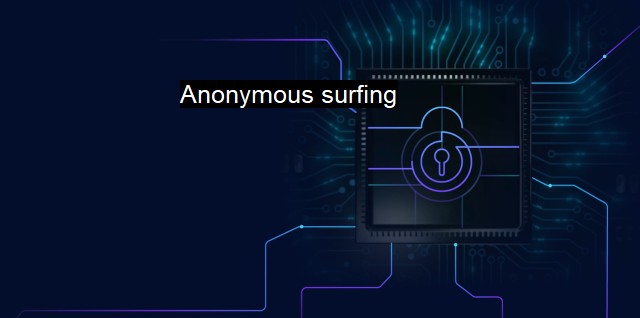What is Anonymous surfing?
The Importance of Anonymous Surfing: How to Browse the Internet Safely and Securely
Anonymous surfing, with refers to browsing the Web anonymously, where personal identifying information, location information, browsing history, and other traceable markers are not stored and transmitted while accessing websites and related services.The intent behind anonymous surfing largely dwells on the fundamental expectation of privacy and freedom from unwanted exposure. In a time where personal data holds significant value, offering it wantonly makes one vulnerable to a multitude of risks. Cyber security is a dimension of defense that comes into play, inclined towards safeguarding an individual or organization's Internet operations.
To understand this better, let's unpack anonymous surfing, cybersecurity, and antivirus protection. Anonymous surfing employs unique techniques that tactical internet-based systems pursue to assure privacy and anonymity while users browse the internet. This technique includes the user's IP address, geographical data, cookies, or transactional data that might reveal their identity.
The most typical form of anonymous surfing is the use of Virtual Private Networks (VPNs). VPNs serve as an anonymizing tool by re-routing internet traffic through one of their servers somewhere around the globe. This process masks the user's original IP address, significantly hindering attempts to track the user's online activity. although corporations often use VPNs to protect sensitive data, average internet users would also benefit from this technology.
Similarly, Proxy servers, Tor networks, software conveniently named 'anonymizer' programs, and even customized web browsers all fall under the umbrella of anonymous surfing tools. These tools each have their unique approach to veil users behind a shroud of encryption and misdirection.
Although anonymous surfing is more than just altering or hiding IP addresses. Strategies like cookie management, disabling scripts, using encrypted connections (HTTPS), and even pseudonymization - using a pseudonym for username, email id, etc., contribute to a more comprehensive anonymity.
Let's tie in cybersecurity and antivirus here. These two components form an integral part of Internet privacy protection, in which anonymous surfing plays a significant role. Cybersecurity refers to the encompassing practices, technologies, and processes used to protect web-based systems, networks, and data from digital threats mainly attempting unauthorized access, alteration, or destruction of data.
On the other hand, antivirus is a type of utility used for scanning and removing viruses from your computer. Antivirus programs play a cornerstone role in cybersecurity dynamics as they cleverly identify, restrain and eradicate potential threats to the system.
When anonymous surfing is integrated with stringent cybersecurity and antivirus efforts, it creates a fortified boundary, protecting the individual or business from assortments of cyber hosts. These may range from annoying targeted advertisement companies, snoopy government surveillance, electronic fraudsters, cyber-bullies, identity thieves, etc. Hence, anonymous surfing isn't about enabling questionable online behavior, but more about asserting fundamental rights to privacy, freedom, and self-protection towards an array of unsolicited digital dangers, each having the potential of escalating into critical life-altering incidents.
In summation, anonymous surfing is a powerful tool to reduce one's cyber footprint. these tools won't prevent all traces of internet activity and may have performance impacts on browsing speed. As with cybersecurity and antivirus tools, nothing provides 100% safety, and they are part of a broader suite of measures to minimize risk. Understanding and deploying a combination of these strategies will contribute to a safer online experience.

Anonymous surfing FAQs
What is anonymous surfing?
Anonymous surfing is the practice of browsing the internet while keeping your identity hidden. This can be achieved by using tools such as VPNs or Tor browsers that encrypt your online activity, making it difficult for others to track you online.Why is anonymous surfing important for cybersecurity?
Anonymous surfing is important for cybersecurity because it protects your personal and sensitive information from being exposed to hackers or cybercriminals. By keeping your online activities anonymous, you minimize the chances of your data being intercepted, stolen, or misused by unauthorized parties.How does anonymous surfing help prevent virus infections?
Anonymous surfing helps prevent virus infections by allowing you to browse the internet without leaving any trace of your online activity. This makes it difficult for cybercriminals to infect your device with malware or viruses as they cannot track your device. Additionally, some VPNs and Tor browsers have built-in antivirus features that protect your device from potential threats.Is anonymous surfing legal?
Anonymous surfing is generally legal as long as the user abides by the law and does not use it for illegal activities such as accessing prohibited content or engaging in cybercriminal activities. However, some countries have laws that restrict or prohibit the use of anonymity tools, so it's important to be aware of your local laws before using them.| | A | | | B | | | C | | | D | | | E | | | F | | | G | | | H | | | I | | | J | | | K | | | L | | | M | |
| | N | | | O | | | P | | | Q | | | R | | | S | | | T | | | U | | | V | | | W | | | X | | | Y | | | Z | |
| | 1 | | | 2 | | | 3 | | | 4 | | | 7 | | | 8 | | |||||||